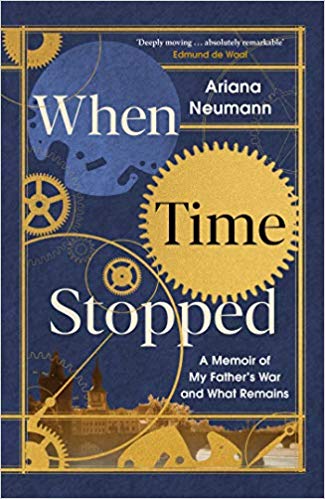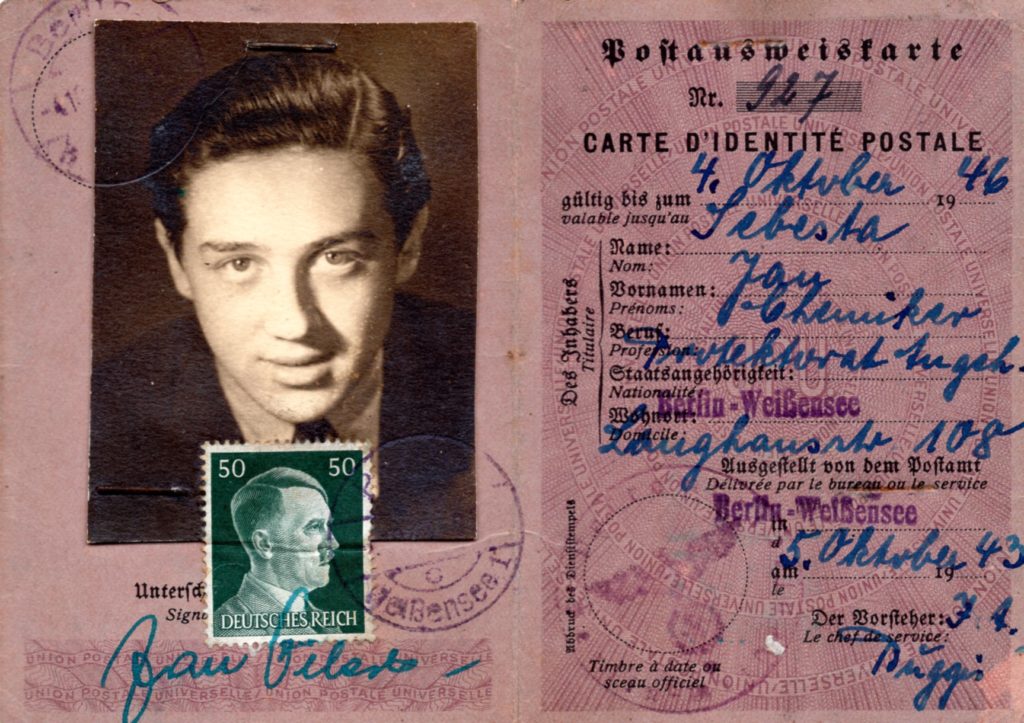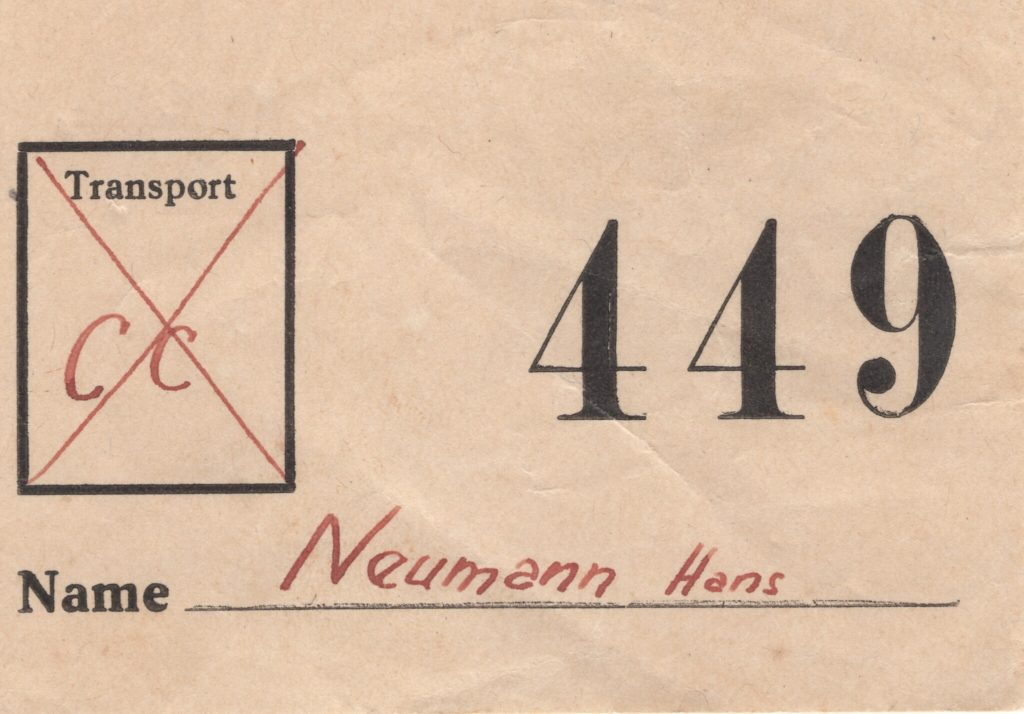Ariana Neumann “When Time Stopped”
…it was during a period he had so much time on his hands that he felt that time had stopped.
How could time have stopped?
‘Because,’ he said, ‘and you will understand this when you are older, sometimes you feel that everything around you has come to an end. You feel that you are completely alone, that time is frozen and that you are invisible. At first, you might feel exhilarated by the sense of freedom, but then you’ll be frightened that you are lost and you will never be able to go back.’
He explained that when he first felt this, he had been isolated and afraid and had prised open his watch case to verify that time was indeed passing. The rhythm of the watch might have been imagined. Sound was not enough, he needed to see and touch it. It was the first time that he had dismantled a mechanism. The turning wheels, ticking each second away, had reassured him.
It was then that he had comprehended the importance of time.

Ariana Neumann was raised in Caracas, Venezuela as a Catholic. Her father, Hans Neumann was an established businessman who was also seen as a patron of the arts. Ariana was Hans’ daughter by his second wife. Ariana had a fairytale upbringing. Living in a large home, stuffed with beautiful pieces of art. She had loving parents and had everything that she desired. It is evident in the book trailer which is based on a series of home movies.
Ariana Neumann’s debut book When Time Stopped is a memoir about uncovering the truth about her father’s past. Despite the idyllic childhood he gave her, there were certain topics that were taboo. One of these were questions about his past. It was during a “spying” game that nine-year-old Ariana had created with her friends that one of her friends/spies reported that they had witnessed her father carrying a cardboard box into the library. Later in the day she decided to investigate for herself. Ariana found the box. Ruffled through its contents. Found it contained only a slim collection of papers. Most written in a language she could not comprehend. Then she spotted an identification document with an unrecognisable name — Jan Sebesta– and a young man’s photograph, an unmistakable likeness to Hans, and stamped below it was also a picture of Hitler. She was startled. She ran to her mother distraught at her discovery. Her mother placated Ariana and told her not to worry. Yet it shook Arian’s world realising that her father was not who he was. After that the box disappeared. She never saw it again. Until her father passed away and she was clearing his drawers. She then discovered the box once more. This time it was stuffed with more papers, mostly in languages she could not read. Equally puzzling were the nightmares her father had when he would scream aloud in a language Ariana could not understand.

When Time Stopped is a memoir that reads like a well told mystery story as Ariana uncovers the truth about her father. A beloved father who was exceedingly busy and built an extraordinary business empire established first in the paint industry. A father who was so immersed in his work that even his own daughter had to seek an appointment with his secretary in order to have some time alone with him. A father who threw himself into his work that he was effectively able to compartmentalise his life and seemingly not let anything deter him. It was this father whom she had persuaded to visit Prague as part of a business delegation in the early 1990s. She had accompanied him. At the time he had let his mask slip briefly when broke down at the fence of Bubny station.

When Time Stops is a fascinating account of how Ariana uncovers her father’s past, discovers he was a Holocaust survivor, who had lost twenty-five members of his family in the pogrom conducted by the Nazis. He had managed to escape by extraordinarily living in Berlin, under the watchful eye of the Gestapo, as a Christian. He was convinced that “the darkest shadow lies beneath the candle”. From there he fled to Venezuela with his older brother. Unfortunately his parents and extended relatives perished in the gas chambers. The Neumann’s had a thriving painting business in Prague. They were Czech Jews whose lives had been upturned with the invasion of the Germans in March 1939.
While researching for this book, Ariana Neuman discovered that she had relatives spread acrosss the world. She contacted them. Also discovered that there was a list of Jews who had perished during the war posted on the walls of a synagogue in Prague. She found her father’s name that had a question mark against his death. When she called and asked him about it, he merely said, “I tricked them”. Ariana also discovers that her paternal grandparents had been sent to a concentration camp that ordinarily operated as a labour camp so rules governing its administration were relatively “freer” than the other camps. Hence her grandparents while being incarcerated inside were able to send letters and parcels to their sons and at times receive illicit parcels containing packets of food and bare essentials. Extraordinarily it is the emergence of these letters after more seventy years that for the first time reveals to many the manner in which these camps operated. They had a well-defined economy and administrative structure. Ariana’s grandparents letter shed light on these internal mechanisms as well as some of the despicable horrors, many of which they were unable to recount, yet alluded to them. Ariana stumbled upon these parcels while investigating into her past. As she reached out to newly found relatives she discovered that they had similar boxes of papers as she had. These contained letters and pictures. Using the services of a Czech translator, Ariana painstakingly translated and read all the correspondence. Then filled in the gaps with her research. Result is this book. This extraordinary memoir.
When Time Stops is about Ariana discovering that the stray remarks fellow students made at school and university questioning her Catholic upbringing and at times bluntly saying she was a Jew were all true. They knew. She did not. It is more than just the passionate love of her father’s for his 297 clocks that he so carefully cared for. He had his own workshop in a windowless room where he tinkered with his precious watches, some of them going back a few hundred years. Yet of all the beautiful pieces he owned, it was an ordinary dull gold one that he was most fond of as it reminded him of the time piece his own father possessed. A link that the daughter put together after her decades of investigation into her past.
While being an fascinating account of a life, When Time Stops is also a horrifying read for the many parallels it has with modern life. Many countries today are questioning the citizenship of their people and creating scenarios that are eerily similar to those described in this book. It is worth reflecting upon. How much of the past needs to be shared and kept alive through memories as a lesson to future generations on the horrors that humans can inflict upon their own? How much of the past that is kept alive is actually used by future perpetrators as case studies? It is a tricky balance to achieve in this grey and gloomy world. Having said that When Time Stopped is worth reading for it stands out as a very well written memoir, balancing extensive research with the personal stories.
*The pictures used in this blog post have been published in the book and on The Israel Times website.
9 March 2020

No Comments